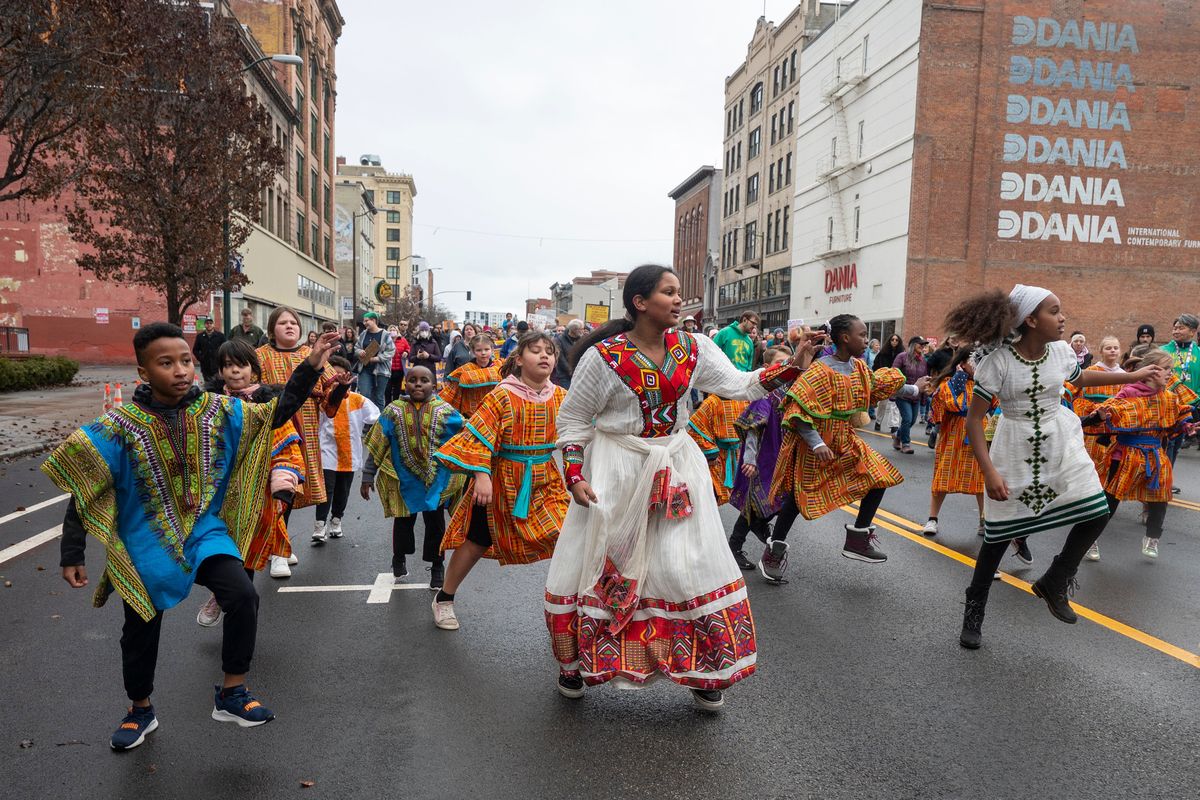‘You be the change’: Martin Luther King Jr. Day rally and march returns in person to Spokane

Hundreds filled a ballroom inside the Spokane Convention Center on Monday to remember the life and legacy of Martin Luther King Jr. after the COVID-19 pandemic put a two-year halt on the in-person event.
The Rev. Percy “Happy” Watkins, known for his recitation of the “I Have a Dream” speech every year, was unable to attend for health reasons. He still delivered the speech, however, via a video recorded in 2021 that was projected in the ballroom.
Amy Chase, a cellist from the Spokane Symphony, accompanied his speech in the video, which showed footage of past Martin Luther King marches in Spokane.
Watkins helped organize Spokane’s Martin Luther King Day events in the 1980s. Freda Gandy, executive director of the Martin Luther King Center, announced a new scholarship named in Watkins’ honor.
Happy Watkins’ son, the Rev. James Watkins, pastor at New Hope Baptist, talked about his father’s life work to bring unity and equality to Spokane. “This scholarship will embody the work that he’s done,” he said.
“Happy means so much to this community,” Gandy said, “we wanted to honor him with this scholarship while he’s still here with us.”
City Councilwoman Betsy Wilkerson read a proclamation on behalf of the city declaring Jan. 16 as a day of observance, with an invitation for “citizens to participate in a day on, not a day off, to celebrate the civil rights leader’s life and his legacy.”
Youth played a prominent role in the program.
“I keep telling them that they’re not the future, they’re the now,” Gandy said. “We need them to take their rightful place now.”
Dontae LaMere, a sophomore at North Central High School, delivered a land acknowledgment for the grounds of the Spokane Tribe.
JaNese Howard, a Shadle Park High School student, sang the National Anthem and another song called “Stand Up,” a soulful piece about the Underground Railroad. The crowd stood up and clapped along.
Vernon Glass, who is part of the Black Student Union at Rogers High School, gave a speech on unity, participation and community.
He asked the audience to take a moment to look at the people around the room and consider the unity that brought everyone together. “If you want your message to be heard, you can’t do it alone,” he said. “And nobody at this rally today should be feeling alone.”
Community participation was necessary to end segregation, Glass said.
Jerrall Haynes, civil rights coordinator for the city of Spokane, followed up by imploring the community to do more on a daily basis to realize King’s dream.
“I don’t think us joining together as community and marching down the street once a year is nearly enough,” he said. “Every day, every week and every month that we let pass by without us doing the necessary work to get us closer to achieving Dr. King’s ultimate dream of beloved community is disrespectful to his memory and legacy, at best.”
It has been nearly 60 years since King’s “I Have a Dream” speech. “And yet, we have not fully achieved the dream,” said Stephy Nobles-Beans, the associate chaplain for diversity, equity and inclusion at Whitworth University, who gave Monday’s keynote speech. “It’s still unfolding.”
Nobles-Beans described the necessity of hope in the face of adversity. “I am hopeful, Spokane, that we as a community will come together in the midst of despair, in the midst of injustice, in the midst of inequality.”
She challenged those who complain when things do not change year after year. “You be the change!” she said.
King was not only a dreamer, he was a game changer who walked the talk of his dream.
“Persistence is a cornerstone of impact,” Noble-Beans continued. “Be persistent, be tenacious, be determined, be steadfast and be relentless. You be the change!”
Noble-Beans punctuated her speech with civil rights anthems. She encouraged everyone to consider the unique gifts and talents they have been called to contribute.
After the rally, the crowd marched through downtown Spokane, continuing the tradition of civil rights marches, waving signs and banners with Martin Luther King quotes, including “Injustice anywhere is a threat to justice everywhere.”